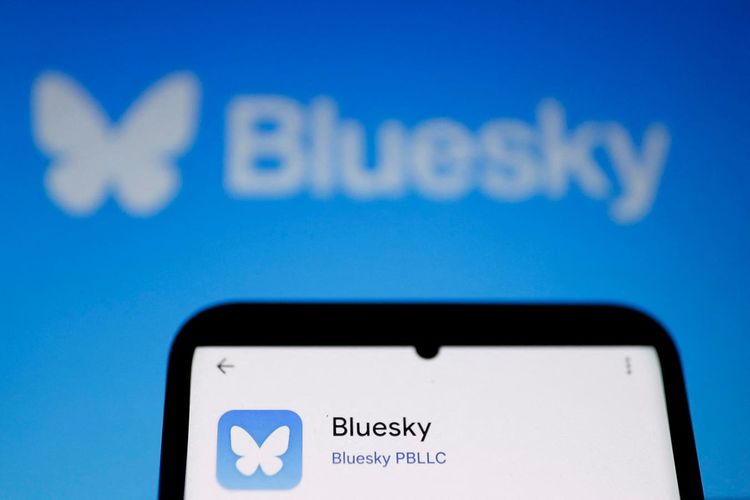X Exodus—Is Bluesky On Track To Be The New Twitter?

Bluesky is becoming a potential substitute for X (previously called Twitter). (Image by Ian LANGSDON / ... [+] AFP) (Image by IAN LANGSDON/AFP via Getty Images)
Two years after tech entrepreneur Elon Musk acquired Twitter—eventually renaming it and making many other changes—a newer contender might actually take its place. Although platforms like Meta's Threads were previously viewed as the likely successor to the well-known microblogging site, Bluesky might now have a significant edge.
It resembles Twitter in appearance and functionality, and there's a valid explanation for that.
Jack Dorsey, the former CEO of Twitter, started the company Bluesky as a project within the social media platform in 2019. It transitioned into an independent entity in 2021. Initially, Bluesky was available only through invitations, but it became accessible to everyone this February and has experienced consistent growth since then.
Although it only has a small portion of the hundreds of millions of users currently on X—which was formerly Twitter before Musk took over—Bluesky has rapidly attracted 1.25 million new users since last week's 2024 presidential election, bringing its total to 15 million subscribers.
More significantly, brands and well-known users are now moving away from X and seeking clearer, more promising options.
X No Longer Marks The Spot
On Wednesday, The Guardian declared that it would stop sharing content on Musk's social media site. Additionally, former CNN commentator Don Lemon, who had a short collaboration with the Musk-owned platform, also announced his exit. This week, actress Jamie Lee Curtis joined the list of celebrities leaving X.
The Guardian has announced plans to transition to Bluesky, but it remains uncertain if Lemon or Curtis will also make the switch to this alternative to X, although some others have already joined the platform.
"Several companies and brands, including the British news outlet The Guardian, have signed up for Bluesky in a move to distance themselves from X," said Laura Graham, a public relations expert and faculty member at North Carolina Central University.
Musk's backing of President-elect Donald Trump has contributed to the recent departure of users from X, but that's just scratching the surface of the issue.
"Many users, fed up with the negativity and unwelcoming atmosphere on social media, are actively seeking other options to X, hoping for a return to the more positive and friendly days of online interaction," said Scott Steinberg, a social media expert and brand marketing consultant.
"At this moment, individuals are seeking a comfortable and inviting environment where they can prioritize meaningful conversations and creativity," Steinberg added. "Currently, any social media platform that fosters calmer discussions and promotes healthier self-expression seems very promising. For the time being, it offers a more enjoyable and less exhausting experience."
Bluesky: A Closer Alternative To Twitter
This is the most recent spike in Bluesky's growth, which welcomed 2.6 million new users in August following the ban of X in Brazil. On one particular day, about 500,000 new users—primarily from Brazil—joined the platform.
Bluesky seems poised to attract a growing number of users because it closely resembles the old Twitter, while eliminating many of the features that long-time users found frustrating, especially after Musk took over.
"Bluesky provides benefits that go beyond simply not being like other platforms," Graham explained. "It doesn’t permit paid advertisements, monetization of content, or payments to enhance posts or prioritize replies. This means businesses and influencers will need to focus on fostering genuine connections with their audiences. Brands aiming for deeper community engagement rather than commercial interactions will likely appreciate what Bluesky has to offer."
Bluesky has been promoted as a platform focused on allowing users to personalize their experience. While this opens up possibilities, it also presents several challenges. Additionally, there are uncertainties regarding how the platform plans to generate income. For the moment, however, the main goal is to build a strong community.
"The platform enables users to build more specialized communities by adjusting moderation, servers, and content. Brands looking to connect with specific niche audiences may find it simpler to discover these groups on Bluesky," explained Graham.
The startup has the potential to provide a wide range of personalization options for its users, which could put increased pressure on businesses and brands to connect with their target audience. Graham pointed out that users can filter out hashtags, adjust moderation settings, and participate in specific servers and communities, allowing them to tailor their experience. While this level of customization could help in pinpointing distinct market segments, it might also complicate the task of effectively reaching those segments.
This could lead to major obstacles for businesses, brands, and influencers, and many may decide not to fully transition to Bluesky.
According to Graham, Bluesky aims to create a platform that emphasizes user engagement and personalization without depending on advertising revenue or the sale of user information. It's a space where brands and content creators can easily connect with their audience. However, those brands that are seeking additional methods to sell their products or generate revenue from their content might not find it as suitable. Companies wanting to invest in advertising to enhance their reach, or influencers looking to profit from their content and promote their sites, will have to explore other options.

























































